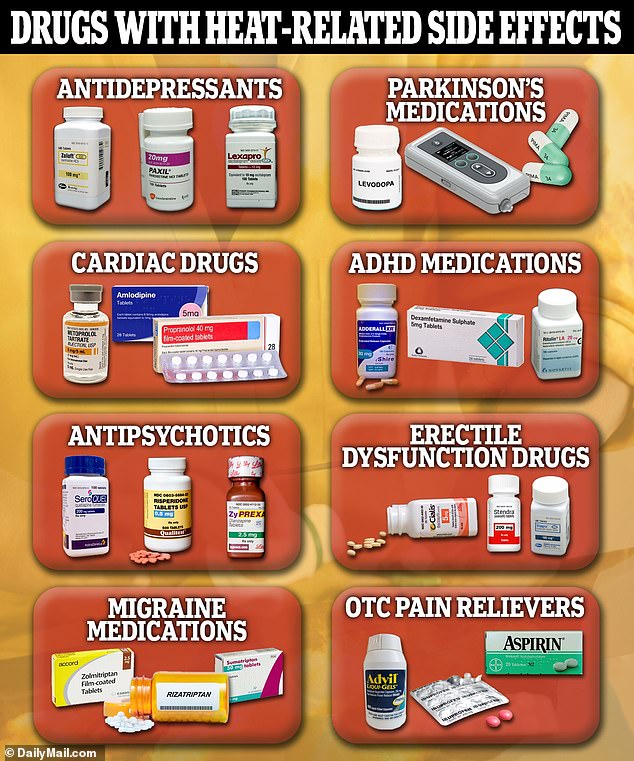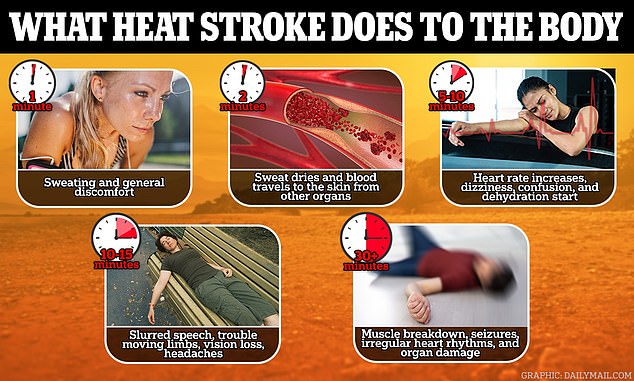I’m a Pharmacist – These 8 Everyday Medicines Can Cause Dangerous Side Effects in Extreme Heat




With another heat wave hitting the US, several medications in your medicine cabinet could be causing high temperatures.
In recent weeks, more than 100 million Americans have endured an extreme heat wave, with temperatures on the East Coast soaring to 100 degrees Fahrenheit (38 degrees Celsius) while southwestern states braced for temperatures of 120 degrees Fahrenheit (49 degrees Celsius).
While prescription and over-the-counter medications have a long list of side effects, some have been shown to cause symptoms that can be fatal during extreme heat.
Pharmacists and emergency room doctors have told DailyMail.com which common medications can make you sweat more and overheat in extreme heat, putting you at risk of dehydration, kidney damage and heat stroke.

Pharmacists and emergency room doctors revealed to DailyMail.com which medications can lead to excessive sweating, overheating and other potentially dangerous effects

Antidepressants
Tricyclic antidepressants (TCAs) are an older class of medications than the more common selective serotonin reuptake inhibitors (SSRIs).
Some of the most common examples of TCAs are amitriptyline and nortriptyline. The CDC estimates that one in 10 Americans over the age of 12 takes antidepressants, which amounts to about 37 million people.
TCAs are less commonly prescribed than newer SSRIs because of their more severe side effects, including insomnia, bedwetting, and chronic pain conditions such as fibromyalgia.
TCAs disrupt the production of the neurotransmitters serotonin and norepinephrine, which prevents sweating. This process is called anhidrosis or hyperhidrosis.
Sweating helps cool the body, but when it fails, it can lead to heat exhaustion or heat stroke.
Meanwhile, Dr. HaVy Ngo-Hamilton, clinical advisor at BuzzRx and pharmacist at the University of Minnesota Medical Center, told DailyMail.com that SSRIs such as sertraline (Zoloft) and paroxetine (Paxil), as well as the dopamine reuptake inhibitor (NDRI) Wellbutrin, can cause excessive sweating.
a recent review found that this occurs in one in ten patients taking SSRIs.
OTC pain relievers
Nonsteroidal anti-inflammatory drugs (NSAIDs), including Advil and Aleve, are among the most common over-the-counter pain relievers.
However, Dr. Ross warned that the drugs carry a risk of kidney damage, which can be worsened by high temperatures.
This is because NSAIDs inhibit the production of prostaglandins. Prostaglandins regulate blood flow to the kidneys.
Extreme heat can further increase kidney damage due to fluid loss and dehydration.
These medications have also been shown to cause excessive sweating.
However, according to a 2019 study, NSAID-induced kidney disease is rare, occurring in only one percent of cases. JAMA Network Opened.
Research from Florida Atlantic University shows that 29 million adults use some form of NSAID for pain.
Medicines for Parkinson’s disease
Medications for Parkinson’s disease, a progressive condition that affects the nervous system, can help manage symptoms such as tremors and a stiff gait.
An estimated 1 million Americans are living with this condition, and about 80 percent of them are taking such medications.
Dr Jared L Ross, an emergency physician and associate professor at the University of Missouri School of Medicine, told DailyMail.com that these drugs “can interfere with sweating and the brain’s ability to regulate its temperature.”
a Study 2023 For example, researchers from the National University of Singapore found that Parkinson’s disease drugs that increase dopamine production can impair sweating and temperature regulation.
This can be especially dangerous for older patients, who are most likely to suffer from Parkinson’s disease. Older people already have difficulty regulating their temperature, because they have less fat under their skin and their sweat glands no longer produce as much sweat as they used to.
Heart medicines

Several heart medications have been shown to cause heat-related side effects.
Beta blockers, for example, are medications that are designed to lower blood pressure and block the effects of the hormone epinephrine, or adrenaline. This helps to improve blood flow and slow the heart rate.
However, a Study 2022 from Yale University found that the drugs may be linked to an increased risk of heart attack during hot weather.
The researchers looked at nearly 2,500 adults who had a nonfatal heart attack in Germany during the summer of 2001 to 2014. The team found that those who took beta blockers were 65 percent more likely to have a heart attack during the summer than those who didn’t take them.
Patients not taking these medications were not at increased risk.
In addition, ACE (angiotensin-converting enzyme) inhibitors, which treat high blood pressure and heart failure, have been shown to cause excessive sweating and hot flashes, which can lead to heat intolerance in high temperatures.
The American Association of Colleges of Pharmacy estimates that 117 million prescriptions for beta blockers have been dispensed to 26 million Americans. About 41 million have been prescribed an ACE inhibitor.
ADHD medications
“Stimulant medications used for ADHD have significant heat-related effects,” Dr. Ross said.
These include activating the hypothalamus, the brain’s control center, to increase the body’s core temperature, making you feel warmer overall. They have also been shown to increase sensitivity to the sun.
Dr. Ross also noted that medications such as Adderall can lead to decreased blood flow to the skin, caused by constriction of blood vessels. This inhibits sweating.
Dr. Katy Dubkinsky, pharmacist and founder and CEO of pharmaceutical savings company Vitalizetold DailyMail.com: ‘Amphetamines, which are used to treat ADHD, can raise body temperature and increase the risk of heat-related illness due to their effect on the central nervous system.’
According to CDC data, just under one in 10 Americans under the age of 17 has been diagnosed with ADHD, with approximately 41 million prescriptions written.
Antipsychotics
Dr. Ross noted that several antipsychotic medications, such as clozapine, risperidone, and olanzapine, have been shown to increase dehydration in the summer heat.
According to the Cleveland Clinic, approximately 4 million Americans use some form of antipsychotic medication.
This is because some of these medications are also classified as anticholinergics, meaning they block the neurotransmitter acetylcholine.
This causes the body to sweat less effectively, which can lead to overheating or heat stroke.
According to Yale University, the most common antipsychotics that can cause these effects include Risperidone (Risperdal), Olanzapine (Zyprexa), Quetiapine (Seroquel), and Haloperidol (Haldol Decanoate).
Dr. Dubinsky specifically identified Haloperidol, Olanzapine, and Risperidone as the most likely culprits.
Erectile dysfunction medications
Research has shown that the gold standard for erectile dysfunction, Viagra, causes excessive sweating in some patients.
According to Dr. Ngo-Hamilton, this is because the medication dilates blood vessels and increases blood flow to the penis, allowing for erections to occur.
However, the drug can also increase blood flow to the skin, causing you to sweat.
In addition, about 20 percent of patients experience hot flashes. Other similar medications such as Cialis have also been shown to cause flushing.
However, Dr. Ngo-Hamilton noted that while these symptoms can be unpleasant, they are unlikely to contribute to heat stroke or other adverse outcomes. “I wouldn’t be overly concerned about it,” she said.
Erectile dysfunction is also more common in men over 70. This can lead to more complications from heat, as older people have more difficulty regulating their body temperature.
The most recent data available shows that approximately 3 million Viagra prescriptions were dispensed in the US in 2021.
Medicines for migraine
Certain types of migraine medications have also been shown to make extreme heat even more unbearable.
‘Triptans can cause flushing and increased sweating, although the mechanism is unknown,’ said Dr Ngo-Hamilton.
Triptans are migraine medications that work by breaking down pain. That is, they fight the pain after it starts. They reduce inflammation and block the neurotransmitters that cause pain.
These drugs also mimic the effects of serotonin. Dr. Ngo-Hamilton warned that in addition to heat-related effects, taking triptans with SSRIs could increase the risk of serotonin syndrome, or too much of the hormone.
In severe cases, serotonin syndrome can cause high fever, seizures, irregular heartbeat, and loss of consciousness.
According to the Cleveland Clinic, 1.7 million Americans receive a prescription for sumatriptan each year, and nearly 1 million people use rizatriptan.
Medicines for Parkinson’s disease
Medications for Parkinson’s disease, a progressive condition that affects the nervous system, can help manage symptoms such as tremors and a stiff gait.
An estimated 1 million Americans are living with this condition, and about 80 percent of them are taking such medications.
Dr Jared L Ross, an emergency physician and associate professor at the University of Missouri School of Medicine, told DailyMail.com that these drugs “can interfere with sweating and the brain’s ability to regulate its temperature.”
a Study 2023 For example, researchers from the National University of Singapore found that Parkinson’s disease drugs that increase dopamine production can impair sweating and temperature regulation.
This can be especially dangerous for older patients, who are most likely to suffer from Parkinson’s disease. Older people already have difficulty regulating their temperature, because they have less fat under their skin and their sweat glands no longer produce as much sweat as they used to.




